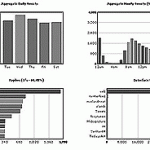How Kit-Kat Made Me Realize Marketing Is Evil

The other day, I wandered into a 7/11 wanting chocolate. I didn’t know which candybar I wanted, I hadn’t decided. And so I stood there, in a colourful aisle surrounded by candy and snacks, looking at boxes and boxes of chocolate bars, mulling over my decision. I surveyed all the screaming colours and smiling cartoons, eventually deciding that I wanted a Kit-Kat.
As I was reaching for the candybar, I was blindsided with a flash of introspection. Out of all the options, why was I picking Kit-Kat?
It was as if all the candybars in that 7/11 were a million tiny marketing execs, dressed in suits in their candybar colours, all yelling at the top of their lungs, clamouring for attention like stockbrokers right before the closing bell. As my hand drew closer, the tiny red marketing men of Kit-Kat cheered and claimed victory, the losers threw a tantrum, moaned, and went back into a huddle to figure out how to yell louder at the next guy who comes down the aisle.
Consumers are horribly undermatched
So much time, energy and money is spent in our society to funnel consumer behaviour into a desired course of action. People devote entire careers to figuring out how to make people buy their candybars. Marketers are in meetings, watching people in fake shopping labs, staying late at work away from their families, so that they can learn how to make strangers think that Axe Bodyspray will increase their virility or that McDonald’s is an essential part of every childhood.
I became horribly sick at the thought that I was starting a career where my sole purpose would be to make people believe that they can’t live without Brand X.
It was in this moment that I realized marketing is evil. Whenever you step into a grocery store aisle, your wits are against the wits of millions of Marketers, armed with consumer tracking studies and pilot tests and multi-city research and loads and loads of statistics.
Soulless Commerce
Manipulation and fakery of the finest details takes place on a daily basis so that Jane and Joe Consumer will pick Brand X.
I thought about all the 30-second ads on TV, and all of the focus groups, rewrites and reshoots that go into them in an effort to exert maximum consumer influence.
I thought about all the billboards and posters on the street and in magazines and how incredibly manufactured it all was, how the models in the pictures were hand-picked from thousands, then tweaked and photoshopped, optimizing appeal for the target audience.
I thought about the creeping, unstoppable march of marketing into our personal lives, and how any blank crevasse of public domain is being claimed under the flag of Advertising. Those miniature yelling ad execs are not just in our grocery aisles, they’re on our gas pumps, in our tv shows, and even on our parking stripes.
I thought about how powerful brands have become, from Nelly naming his daughter Chanel to basketball teams named Burger King Whoppers.

I thought about how nothing is authentic anymore. Marketing has reduced everything to design-by-focus-group and popular culture is usurped to increase Brand Awareness and ROI. Everything wonderful and real became reduced to soulless statistics.
All I wanted was some damn chocolate and instead I got depressed about my career. I needed to take a step back.
The Necessary Evil
Marketing is a field of mercenary psychologists. We are people who are continually trying to figure out what makes consumers tick, so we can get more money. I thought: Is that really so bad? Isn’t that the essence of business?
Marketing is inevitable. There will always be competition and there will always be a need to prove your worth in relation to competitors.
Farmers in tribal villages, fourth graders battling for class president and entrepreneurs seeking funding all rely on marketing. The American health care debate is a fierce battleground of ideologies, and both sides need marketing. Marketing answers the consumer question: Why should I pay any attention to you?
If I lived in complete isolation from media my entire life and wandered into 7/11 looking for chocolate, I, as a consumer, will still use marketing to guide my decision. I may not have been exposed to ads, posters and billboards for the candybars, but I would evaluate packaging…shape…name…price… to make a choice. All of that is marketing.
The Root of Evil
The ugliness of Marketing is that it cheapens so many things, all for an extra dollar. Remember Chocolate Rain? Marketing execs found something that was popular, so they decided to throw money at Tay Zonday and make Cherry Chocolate Rain:
At 8 million views, I’m sure it achieved Coke’s marketing objectives. But there is something disheartening about taking something organic and authentic and slapping brand names all over it.
Gen Y and the Push-Pull
Marketing works when an intersection exists where the brands push and the consumer pulls. Generation Y is living in a time where for the first time, the consumer can control the corporate push. Tivo and Adblock are testaments to this ability.
This selective screening just causes brands and Marketers to yell even louder, causing an escalating arms race between push and pull. This is a strange battle because ultimately marketers and consumers need each other.
Is Marketing Evil?
Is marketing evil? Absolutely, but only in the same way that the gun or the printing press is evil. It is a tool that takes whatever form its owner wants it to take. Power is afforded to whoever uses it.
As the threshold of marketing and corporatization pushes deeper into our personal lives, the only hope I can have is that in my lifetime, I don’t see parents selling naming rights for their children to GoldenPalace.
photos by s2art, marketingfacts